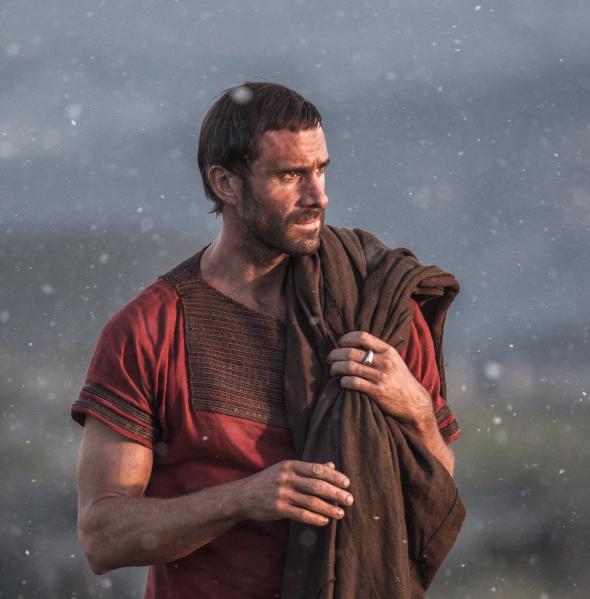The GOP primary debates have been fertile ground for advertisers. Thanks in part to Trump’s telegenic anti-charm, the cost of running a spot spiked early in the campaign season. It’s supposedly stayed high ever since, failing to decline significantly even after Trump pulled out of the Fox News debate in January.
The ads have run the gamut in terms of messaging. A spot for clean energy initiative NextGen that’s run at virtually every debate declares, “We don’t ignore threats like climate change,” seemingly winking at the candidates’ evident discomfort with that very topic. Other ads—such as the one for the sci-fi film The Purge: Election Year that ran during the last debate—mock the political process itself.
But the most memorable commercials may be the ones that seem best suited to the context: As Easter approaches, debate watchers have borne witness to a parade of biblically-inspired—and otherwise religious—trailers, previews for films that many viewers might have never heard of otherwise. Did you know that a movie called The Young Messiah was slated for a March 11 release? I did not. Even with major studios backing them, these films might have slipped under the mainstream radar were it not for the relentless stream of mid-debate advertisements for them. (The films’ respective distributors failed to respond to requests for comment about the specifics of their marketing strategies.)
So what, exactly, are these movies trying to tell us?
Risen
Starring an exhausted-looking Joseph Fiennes, Risen details a Roman centurion’s attempt to determine whether the recently-crucified Yeshua really has come back from the dead. Inevitably, Fiennes’ experiences transform him, and his allegiances change. As virtually every reviewer of the film has noted, its plot echoes that of one of the films-within-a-film from Hail, Caesar!, which likewise details the conversion narrative of a Roman soldier. Both clearly take inspiration from 1953’s The Robe, a widescreen epic with a similar arc. But where The Robe was a massive hit, Risen has continued to mostly fly under the radar since its mid-February release.
The Young Messiah
Remember when Interview with a Vampire novelist Anne Rice took a turn for the religious? Neither does she, apparently. Nevertheless, Christ the Lord: Out of Egypt, a story about Jesus’ childhood that she wrote during that period, has found its way to cinemas as the film The Young Messiah, on the heels of a painful development process. Though the film has been largely ignored by the mainstream press, religious audiences and critics have emphasized its focus on “the relationship of Jesus to Mary” rather than the more familiar story of the crucifixion. Even as it departs from the familiar, however, it hews to certain generic norms: In a detail absent from the original novel, but familiar from other films of its kind, Young Messiah introduces a centurion played by Sean Bean, an actor who presumably knows what it takes to die and live again.
Miracles From Heaven
Miracles From Heaven clearly lays out its premise in its title: When 12-year old Anna comes down with an unexplained illness, her mother—played by Jennifer Garner—prays for a cure. As the film’s trailers indicate, that wish comes true when Anna falls from a tree and hits her head just so. Miracles has received more mainstream recognition than its fellows, much of it built around Garner’s claim that making it renewed her religious faith. While there are, alas, no centurions here to liven things up, the film shares an old fashioned vibe with its fellows.
It’s not just the Christian values of these movies that makes them such a good fit for the GOP debates. With their Roman protagonists, the first two are stories about powerful men who are forced to confront power of a very different kind. The titular cure in Miracles, which baffles the human medical establishment, similarly posits that there are certain forces too mystifying for man to comprehend. In that sense, all three films might be read as accidental allegories of the politicians who clutter the debate stage—overconfident statesmen who are struggling to make sense of Trump’s outsider appeal, buffeted by unintelligible forces beyond their control. While that reading implausibly positions Trump as a salvific figure, it does so by piggy-backing on the image he’s been busily creating for himself for decades.
Simultaneously, by connecting themselves to The Robe, Risen and Messiah lay claim to a very Trumpian conservatism—more aesthetic than it is social or political. Even in its own moment, The Robe was a nostalgic film, one that hearkened back to a more glorious moment in earlier cinematic historic. Our current crop of religious films are likewise selling themselves on the charms of bygone days. Sure, that better past is an impossible, irretrievable fantasy. But these stories are, after all, just myths.
